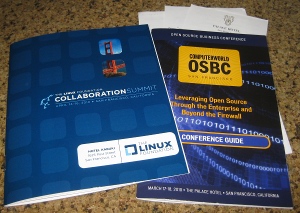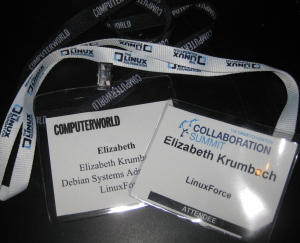
Last month I attended the Open Source Business Conference. Lucky for me it was located at The Palace Hotel, right down the street from where I live! As I mentioned previously, I was able to gain entry by volunteering at the local groups table. I was fortunate enough to be able to attend all the talks in addition to manning the table. Several of the keynotes were quite good, but my favorite talk of the conference came from Ravi Simhambhatla, the CIO of Virgin America, who spoke about the wealth of F/OSS tools that were being used within VA. I think sometimes in my day to day work as a sysadmin and my volunteer work encouraging adoption of Ubuntu I feel as if it’s an up-hill battle to convince people that F/OSS tools are not just free (as in monetary value) but are quite often better than proprietary options, so seeing Simhambhatla so enthusiastically talk about the huge improvements across the board by switching from proprietary to F/OSS tools was quite inspirational. The CEO of EnterpriseDB, Ed Boyajian, gave an interesting talk about how F/OSS hasn’t really made its mark on the enterprise database market and what can be done to change that – including exploring the distinction between MySQL (is, and always has been, focused at webapps) and PostgreSQL (the more enterprise-ready database). I also saw Tim O’Reilly speak for the first time, and heard a great keynote from Jim Whitehurst of Red Hat on the value of F/OSS which must not strictly be put on a static monetary value for a task, but instead focus upon the flexibility that F/OSS provides allowing you to accomplish that task, and more, with a smaller budget (a subtle, but important, difference when discussing IT budgets!).

Last week I attended the Linux Foundation Collaboration Summit down in Japantown, an easy ride on the 38L bus – and not a bad walk home on the last day when it was still daylight upon leaving I wasn’t in the mood for a bus. The summit itself was quite an event with a lot of very impressive folks there. In addition to meeting a lot of local business people who are deploying and developing in F/OSS, I was able to meet Red Hat kernel developer Valorie Aurora and CEO of ZaReason Cathy Malmrose, but I spent most of my time with Landon Jurgens of General Electric (some of their small devices use Linux!) who I know through the New York LoCo team and met last year at the Karmic Release event that I drove to Seneca Falls for. I also met up with Miia Ranta, still in the area from Finland, and whose boyfriend was kind enough to give me a lift home after the first day. I also got to chat briefly with Pete Graner of Canonical and Jono Bacon and I touched base long enough on Friday to throw together some ideas for a Lucid release event at The Thirsty Bear this week.
Content-wise I have to admit, the first day was the best for me with all the great talks (now posted online), the number of people there (overlap of collab summit with a kernel summit event)… and with Chris DaBona giving everyone in the audience at the end of the day a Nexus One (glee, shiny new phone!). Day one also wrapped up with a lovely evening of sushi, open bar and networking at Yoshi’s where I met Jesse Zbikowski – a fellow California LoCo team member who had planned some previous Ubuntu release parties in the area and wanted to meet up for some collaborating on an event post-release of Lucid (it’s looking like we may end up at Noisebridge for an Installfest in late May).

The following two days at the summit a few things were continually impressed upon me, carrying over from what I’ve learned at OSBC:
1. In several areas, F/OSS has Made It Big.
Many companies have shifted from having to be convinced of it’s usefulness to questions of how they go about managing these new tools. Whether it be navigating the plethora of available applications (a topic my boss has blogged about too) or working with development teams who wish to incorporate F/OSS with varying licenses into code that they deploy internally and ship to customers, it’s a challenge. A fascinating talk by a Bradley M. Kuhn about GPLv3 which discussed some of it’s ratification process drove home both these points, there were some big companies with some strong feelings about the direction the GPL was going and during the resulting license reflects some of the pressures that were upon upon the Free Software Foundation. It’s worth saying that in spite of Kuhn’s opinion that it was too “watered down” for his tastes, being more of a practicalist I believe these changes were primarily good.
2. Most of us are cloud critters, and our open philosophies have a place.
I use Google hosted domains for my email, Google docs for collaborative editing, Facebook and Twitter for social networking. Woo awesome new cloud world! Unfortunately I don’t pay for any of these services and completely at their discretion my accounts could be deleted and all data poured into these things lost. Even worse for some companies and people, the data that we pour into these services may be used in ways with which we had not intended, even shared unintentionally (or intentionally!) with 3rd parties. At the OSBC Tim O’Reilly spoke of open data which is a piece of this puzzle (example: no one can come near to matching the data of Google Maps and given Google’s resources for this endeavor I don’t see a competitor arising any time soon, sorry Open Street Map!). The other piece of this puzzle is open cloud services. Enter the AGPL, seeking open web applications in addition to regular open applications that the GPL covers. Shouldn’t we seek to develop and use open services so we can run our own Twitter (hi Status.net!) just like we did with our desktop applications? I haven’t formed a coherent opinion here, primarily due to the collaborative nature that most of these services require. I still use Twitter instead of identi.ca because there are more people on Twitter (and let’s be honest, more regular people use Twitter, identi.ca has a lot of techies). And a F/OSS Facebook? Practically everyone I know is already on Facebook – including distant family I don’t have contact with by any other means. Short of a service that provides full integration of these things – letting me use Facebook AND F/OSS option, Twitter AND identica (possible already, but clunky at best when replies are factored in) I don’t even see myself switching, let alone gathering up others to champion web software freedom. Even then, can’t such integration I want come from really good, flexible APIs and data portability that adheres to open standards? Google already provides this for many of it’s services (I wouldn’t have switched to their hosted domains email service if I couldn’t snag email backups via POP, Google docs would be less useful if I couldn’t export to ODT and several other formats at my descretion) and Facebook’s move to XMPP for IM simply rocks. That may be enough for me.
The cloud thing was really driven home when the last session I attended at the collaboration summit focused on the “Desktop” and ended up being a series of presentations about how the desktop can better interface with cloud services, and what projects within Gnome, KDE, Mozilla and Ubuntu are doing cloud-wise.
3. Mobile devices! Mobile devices! Mobile devices!
Linux is pouring into the consumer mobile devices market – mobile phones, ebook readers, tablets… Google’s gift of a Nexus one at LFCS was not just a kind gesture, they want more and more people using these and doing development on the Android platform, and the audience there was a prime target. MeeGo, a community-developed Linux-based mobile platform for phones had a huge presence at LFCS. Embedded devices are also increasingly using Linux, people are using Linux all the time without even knowing it. Since mobile devices are one of the faster growing markets it’s huge progress that Linux has made such strong inroads here (personal anecdote: a year ago I didn’t have a smart phone, now I have 2 and am pondering an android-based e-book reader as I walk past huge billboards advertising the iPad).
So what did I practically gain from these conferences? Technology is continually moving a fast pace! Alright, I knew that. After OSBC I felt somewhat out-dated as a sysadmin who still maintains unclustered servers out there and edits some config files by hand, but after some thought I realized that I need a healthy bit of living in the now and living in the future must be maintained – and these conferences are very much future-looking. It certainly gave me a nice dose of future to take back to my day job and help motivate me to keep striving for the next infrastructure improvement or automation.

